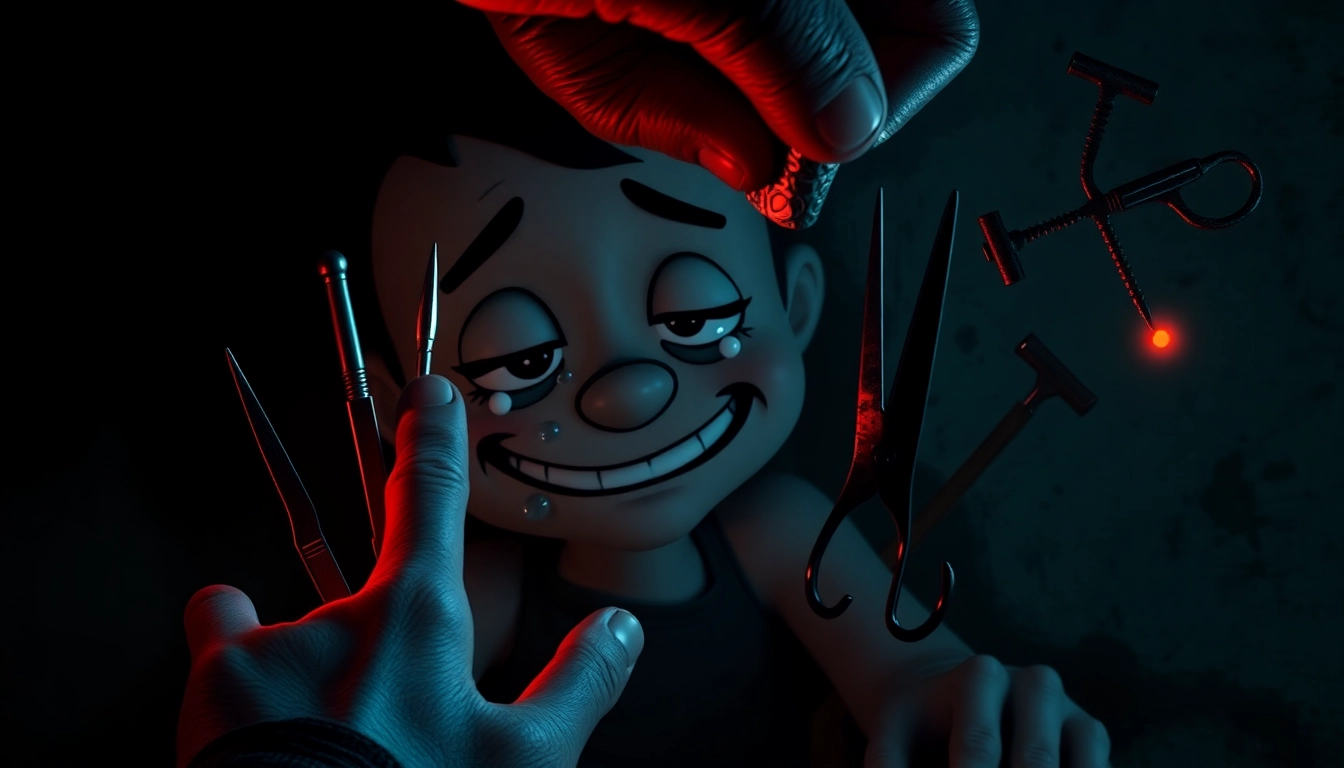Introduction to BLOODMONEY: Dark Psychological Horror Clicker Game
In the realm of psychological horror and morally challenging gaming experiences, blood money stands out as a deeply disturbing and thought-provoking title. This dark clicker game immerses players in a visceral world where every action is fraught with moral consequences, testing the limits of human empathy and survival instincts. Unlike traditional horror games that rely solely on jump scares and atmospheric dread, BLOODMONEY crafts a psychological journey that hinges on decision-making, visual storytelling, and emotional engagement. It invites players to confront uncomfortable questions about morality, greed, and the human condition under extreme stress, making it a unique addition to the horror and indie gaming landscape.
The Narrative: A Desperate Fight for Medical Bills and Moral Boundaries
A Personal Crisis Unfolds
The core story of BLOODMONEY revolves around a protagonist diagnosed with a serious, life-threatening medical condition requiring urgent treatment. The daunting bill of $25,000 looms over them, representing both a financial obstacle and a moral dilemma. With time running out and options dwindling, the narrative introduces a bizarre and unsettling opportunity: a cheerful, seemingly innocent figure named Harvey offers a disturbing solution. Harvey’s proposition is simple but sinister—click on him to generate money needed for medical expenses. This premise immediately sets the tone for a game that explores the dark intersections of desperation, morality, and human nature.
The Dark Narrative of BloodMoney
As the player progresses, the narrative deepens, revealing the unsettling dynamics between the protagonist and Harvey. Initially perceived as a benign helper, Harvey’s cheerful demeanor masks a growing sense of pain and suffering as the clicks increase. The game masterfully depicts Harvey’s transformation through subtle visual cues—his expressions, reactions, and dialogue gradually shift from innocence to distress. The narrative also hints at a darker controlling force behind the scenes, possibly an ominous entity manipulating Harvey and the shop’s offerings, which range from harmless items to increasingly brutal weapons. The story becomes a harrowing reflection on how far individuals are willing to go to survive, and whether moral boundaries can be crossed without consequence.
Game Mechanics: Clicking, Upgrades, and Multiple Endings
Core Gameplay: The Clicker Mechanic
BLOODMONEY employs a straightforward yet profoundly impactful clicker mechanic. Players click on Harvey repeatedly to accumulate the needed funds. Each click not only increases the money but also inflicts pain on Harvey, making each interaction a moral choice—do you click relentlessly for faster gains, or do you hold back to minimize suffering? The game’s simplicity in controls contrasts sharply with its complex moral decisions, creating a tension that keeps players engaged and emotionally invested.
Upgrade System: Enhancing Profits and Suffering
As players gather funds, they can purchase upgrades from the in-game shop. These upgrades include tools like needles, scissors, hammers, and other disturbing implements designed to maximize earnings. Each upgrade offers a trade-off: higher profits come at the cost of increased pain and visual horror inflicted upon Harvey, who begins to exhibit visible signs of suffering and distress. The upgrade system embodies a risk-reward dynamic—players must decide whether to prioritize efficiency or moral integrity. The more violent the tools, the faster the money, but also the more visceral and disturbing Harvey’s reactions become.
Multiple Pathways and Endings
The game’s branching narrative includes three distinct endings, shaped by the player’s choices and upgrade selections:
- The Good Ending: Achieved by minimizing Harvey’s suffering, often by choosing less violent tools and maintaining a moral balance.
- The Normal Ending: A moderate approach where some violence occurs, but not to the extreme levels of the bad ending.
- The Bad Ending: Maximize profit at any cost, using the most brutal tools available, leading Harvey to a tragic and disturbing fate.
These endings serve as a mirror to the player’s moral compass—highlighting the consequences of their actions and decisions throughout the game.
The Moral Dilemma: Choosing Between Innocence and Efficiency
Harvey’s Innocence and Its Contradiction
Harvey is portrayed as an innocent, cheerful character who appears to be willingly participating in the game. Yet, subtle hints suggest he might be unaware of the true nature of the shop’s offerings. His surprise at more violent tools indicates he expects benign items, such as pillows for playful fights, which adds an unsettling layer of moral ambiguity. Are you exploiting a naive character, or is Harvey complicit? The game’s narrative explores this moral gray area, forcing players to reflect on their own choices and the impact of their actions.
The Cost of Profit and the Human Element
Every click generates money but also inflicts suffering, raising questions about the morality of profit at any cost. The game challenges players to weigh their financial needs against the moral degradation they might cause. The more ruthless choices—such as using hammers or needles—lead to faster financial gains but at the expense of Harvey’s well-being, pushing players into a moral abyss. This dichotomy embodies the core moral tension: how much are you willing to sacrifice your humanity for survival?
Visual and Emotional Impact: How Harvey’s Transformation Reflects Moral Decay
Subtle Visual Cues and Dialogue
The game uses visual storytelling to depict Harvey’s physical and emotional deterioration. His appearance gradually becomes more distressed—his eyes widen, his posture changes, and his expressions shift from cheerful to pained. Dialogue interactions further enhance this mood, with Harvey’s tone becoming more fearful and desperate as the game progresses. These subtle cues create an increasingly unsettling atmosphere that immerses players emotionally and psychologically.
Disturbing Visuals and Psychological Horror
The visuals intensify as players select more violent tools, revealing Harvey’s suffering in graphic detail. Blood, bruises, and visible injuries become more prominent, making the moral implications of choices visceral and real. The psychological horror stems from the game’s ability to evoke empathy and guilt simultaneously—players are forced to confront whether their pursuit of survival justifies the suffering they cause.
Community Insights: Player Reactions and Hidden Depths
Player Perspectives and Moral Reflection
Community discussions reveal that players experience a spectrum of emotions—ranging from guilt and remorse to justification and detachment. Many players note that Harvey’s reactions and visual cues evoke genuine empathy, making the moral choices more impactful. Some have expressed surprise at how difficult it is to resist using the most violent tools, emphasizing the game’s success in blurring the lines between gameplay and emotional response.
Hidden Details and Subtle Messages
Players have also uncovered subtle details indicating Harvey might be unaware of the full implications of the shop’s items. For instance, Harvey’s surprise at violent tools suggests a deeper commentary on innocence, manipulation, and the deceptive nature of appearances. These insights deepen the narrative, making BLOODMONEY not just a game about clicking but a layered exploration of morality and human nature.
The Significance of the Game’s Ending Choices
Impact on Player Morality and Reflection
The three endings serve as a moral mirror, prompting players to reflect on their own values. Achieving the Good Ending involves restraint, compassion, and minimal harm, highlighting the importance of empathy even in desperate circumstances. The Normal Ending presents a more balanced view, while the Bad Ending underscores the dangers of unchecked greed and brutality. These outcomes emphasize that choices have consequences, both in-game and in real life, especially when moral boundaries are tested under pressure.
Emotional and Philosophical Implications
The endings also provoke philosophical questions: Are we inherently good or evil? Does survival justify moral compromise? BLOODMONEY’s endings challenge players to confront their own beliefs about morality, human nature, and the cost of self-preservation. The game subtly suggests that the path you choose reflects your inner values and that even in darkness, the possibility of redemption exists.
Reflection: What BLOODMONEY Reveals About Human Nature Under Pressure
At its core, BLOODMONEY is a mirror held up to human nature. It strips away societal norms and reveals the raw, often uncomfortable truths about how individuals respond when faced with life-and-death scenarios. The game demonstrates that morality is often context-dependent and that desperation can blur the lines between right and wrong. Harvey’s innocence juxtaposed with the violent tools highlights the duality of human beings—capable of kindness but also driven by primal instincts when pushed to the brink.
Related Games and Cultural Context
BLOODMONEY joins a lineage of psychological horror and morally complex games that challenge conventional gameplay narratives. Titles like “Don’t Forget” and classic titles such as “Hitman: Blood Money” explore themes of morality, violence, and survival, but BLOODMONEY stands out with its intense focus on moral decay and emotional engagement. Its design philosophy echoes broader cultural conversations about the ethics of survival, the limits of empathy, and the dark side of human nature in times of crisis.
Final Thoughts: Confronting Morality in a World of Desperation
The experience of playing BLOODMONEY is more than just a disturbing game; it is an introspective journey that forces players to examine their own moral boundaries. When life is at stake, how far are we willing to go? The game’s success lies in its ability to evoke genuine emotional responses and provoke critical reflection on moral choices, making it a profound commentary on human resilience and depravity. As you navigate Harvey’s suffering and the choices you make, remember that every click and upgrade reflects a deeper truth about our collective moral compass.
For those interested in exploring similar dark narratives and psychological challenges, BLOODMONEY is a compelling reflection of the darker aspects of human nature. If you want to experience this unsettling journey, discover more about blood money and its haunting exploration of morality and survival.



